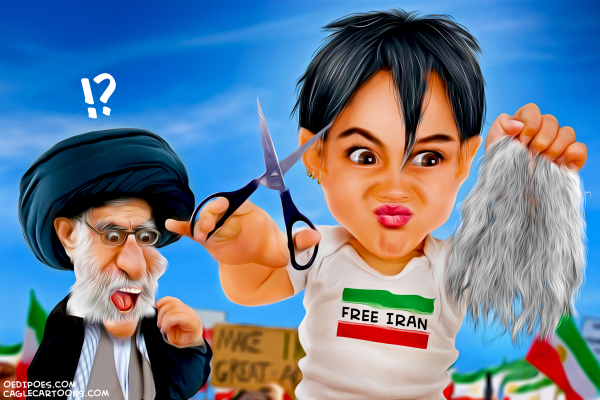
It was a stark reminder of how cultures are different, laws vary and rules about women's behavior are shockingly arbitrary. I began to wonder why we in the West think our own modesty standards are any more appropriate than anyone else's.
For a while after that trip, I felt that hijab rules like the ones I'd seen enforced in Iran were no more outrageous or illogical than our own cover-up rules on main streets and public beaches.
It took me a while to realize I was totally missing the point.
Of course it is puritanical, paternalistic and sexist for any government to tell women how to dress — in the U.S., the Middle East or anywhere else. But in Iran, the hijab laws are about more than just the hijab, and protests against the hijab rules are a protest against something much broader.
In the current unrest, which has been underway for three months, the hijab — the mandatory hijab, that is — should be seen at least partly as a proxy, the tangible symbol of all manner of societal discontents, including a broad lack of freedom, the government's assault on individuality and bodily integrity, the overreach of religion, the denial of self-determination.
Certainly the protests were sparked by the country's outrageous head scarf laws — and specifically by the horrific mid-September death of Mahsa Amini, a 22-year-old woman who died in police custody after being arrested in Tehran for allegedly wearing her hijab improperly.
But in the months since Amini's death, the protests have grown and spread, becoming a much more generalized howl of discontent against the government. Some 18,000 people have been arrested in protests in scores of cities. Human rights organizations count more than 400 people killed by Iranian security forces.
Two protesters have been executed this month. One was accused of stabbing two members of a paramilitary force; he was bound at the hands and feet, with a black bag placed over his head, and hanged from a construction crane. Both executions lacked due process and may have relied on coerced confessions.
As many as a dozen more protesters are on death row. Lawmakers have called for no leniency, saying chaos must not be tolerated, although the government also appears to be carefully calculating how severely it can afford to crack down. The authorities have blamed foreign governments for fomenting the unrest.
Though the uprising began over headscarves, protesters these days are shouting full-on anti-regime slogans and anti-clerical chants. They're burning hijabs, but they're also burning images of Supreme Leader Ali Khamenei and shouting, "Death to the dictator." The protests reflect the expanding rift between the people and the government. "Woman, life, freedom" is not just about women's issues — it's also about censorship and liberty, and it's an outpouring of unhappiness from alienated young people who've seen living standards decline and economic grievances mount.
The revolt may be crushed, or it may fizzle out, as previous uprisings did in 2009, 2017 and 2019. But it's clear the demonstrators' complaints won't be satisfied by minor tweaks to the headscarf rules, at least not for long.
The sclerotic government under Khamenei, an 83-year-old ayatollah who has offered no clear plan for succession or reform, had better watch its step.
Why and how did the hijab become such a potent symbol for such a powerful uprising? Partly it's Amini's death, but it's also that the headscarf is such a blunt and unsubtle reflection of the regime's determination to control its citizens.
The hijab laws reflect the theocratic leadership's bizarre obsession with chastity and purity and micromanaging the sexual behavior of men and women. They are justified by the religious authorities on the grounds that women shouldn't become a sexual distraction to men.
Many Muslim women wear the hijab voluntarily. That's their right, of course. But Iran is one of very few countries that requires all women to cover their heads in public. Some countries have repealed or loosened their headscarf requirements.
The hijab wars in Iran go back at least to 1936, when then-leader Reza Shah Pahlavi banned headscarves in certain public places. Even then, the hijab — or rather the lack of one — was a stand-in for "modernization" and "Westernization." His decree, which survived for only a few years, outraged conservative clerics, and many traditional, religious Iranians as well. (In that period, some women reportedly had headscarves physically ripped from their heads.)
During the 1970s, in the years leading up to the Iranian revolution, wearing a hijab became a sign of opposition to the monarchy.
Then, in a turnabout after the 1979 revolution, thousands of women took to the streets to oppose mandatory headscarf rules, in what were the first protests against the new regime.
The hijab has sometimes been downplayed as the least of women's concerns in a country that often requires them to have a man's approval for travel, and where inheritance and marriage laws generally favor men.
But as the protests enter their fourth month, the hijab has demonstrated once again its symbolic — and substantive — power.
On Wednesday, the United Nations voted to remove Iran from the Commission on the Status of Women, for whatever that is worth. U.S. national security adviser Jake Sullivan denounced the executions and other Iranian "atrocities." Economic sanctions have been tightened.
In the end, though, it is the Iranian people — and the depth of their anger and their willingness to keep fighting against the state — that will determine how far this goes.
(COMMENT, BELOW)
Nicholas Goldberg
Los Angeles Times/(TNS)
Nicholas Goldberg is an associate editor and op-ed columnist for the Los Angeles Times.
Previously:
• 11/10/22 Should I call my doctor 'doctor' or is that passe?
• 10/31/22 Where have all the English majors gone?
• 10/10/22 Did the 23-year-old Columbine attack inspire last week's school shooting in Russia?
• 09/19/22 The real reason Americans love royalty
• 09/14/22 We can't compartmentalize away our apocalyptic future
• 09/12/22 If it costs $23 to enter Manhattan by car, is that fair to lower-income drivers?
• 09/02/22 Twisted Sister's Dee Snider to MAGA 'fascists': Write your own damn songs
• 08/29/22 Shakespeare, mathematics and the monkey who called 911
• 08/15/22 The creepy battle over Charles Manson's paltry estate
• 07/27/22 Why do people believe in conspiracy theories?
• 07/20/22 How would you feel if you lost $58 billion? Would you still buy that superyacht?
• 07/13/22 Are animals people, too?
• 07/06/22 Are Joe Biden -- and Dianne Feinstein -- too old to do their jobs?
• 05/19/22 Huge corporate diversity loss. GREAT
• 04/20/22 When bathrooms have naming rights, has branding gone too far?
• 04/13/22 Why I won't cheer as Germany ends its antiwar experiment
• 04/04/22 In Europe, the war in Ukraine raises the question --- is the past really past?
• 02/22/22 What if the CIA is spying on Americans?
• 02/10/22 Is civility really passe in American politics?
• 01/27/22 Why do murderers have to show 'remorse' to be granted parole?
• 01/25/22 Are you anxious about reentering the post-COVID world? Maybe you have 'cave syndrome'
• 01/11/22 When an anti-vaxxer dies of COVID, is that cause for glib, ironic satisfaction?
• 12/29/21 Can the US strike a balance between isolationism and policing the world?
• 12/16/21 If the Miss America beauty pageant isn't a beauty pageant, then what exactly is it?
• 12/08/21 How did the party of 'Happy Days Are Here Again' become the party of Eeyore?
• 11/11/21 History reveals: Nicholas Kristof for political office? Delusional
• 10/01/21 Think vaccine mandates are controversial? What if police held you down and injected you?
• 09/13/21 If you don't say what they like, protesters show up at your door. Is that OK?
• 08/05/21 Think toxic Cuomo will resign? Think, again!
• 07/14/21 A moral mosquito dilemma in LALA-land
• 06/29/21Is life fair? One-third of Americans think so
• 04/27/21: The Supreme Court debates the all-powerful F-word
• 03/25/21: Do we really need a law mandating gender-neutral toy sections at stores?
• 03/15/21: I've had a cellphone for 25 years. Can I get rid of my landline yet
• 03/15/21: After 365 days of COVID exile, I went back to my office. Here's what I found
• 02/12/21: The preacher and the pornographer: The unlikely, unexaggerated friendship between Jerry Falwell and Larry Flynt
• 02/10/21: Some newspapers are deleting old crime stories to give people fresh starts. Is that wise?
• 12/28/20: Should Bill Cosby's sexual assault conviction be overturned?


 Contact The Editor
Contact The Editor
 Articles By This Author
Articles By This Author